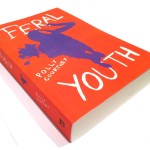 Not all books grab you from the start. Feral Youth does. And it does much more. Many authors, even famous and respected ones, cannot always achieve a satisfactory ending. It’s extremely difficult to keep up the momentum, not just throughout the book but right to the last chapter. So I am quite often left disappointed when a great read doesn’t quite make it to the end.
Not all books grab you from the start. Feral Youth does. And it does much more. Many authors, even famous and respected ones, cannot always achieve a satisfactory ending. It’s extremely difficult to keep up the momentum, not just throughout the book but right to the last chapter. So I am quite often left disappointed when a great read doesn’t quite make it to the end.
This wasn’t the case with Feral Youth. The tension is sustained throughout, and there were quite a few instances, especially from the middle onwards, where I found myself muttering ‘please, please don’t do that’ or ‘please Alesha, don’t go there.’ Indeed at times I almost held my breath fearing what the next twist would be. Like most readers, I had my own views on how I wanted it to end.
We really do get into Alesha’s head and see the world through her eyes.
Alesha’s attitude and life experience wasn’t the eye opener for me that it may have been for some readers because I worked as a social worker in a deprived borough many years ago. I know that the swagger and apparent indifference is a mask. Nevertheless it is a mask that is extremely hard to penetrate even, and maybe especially, for professionals. We are after all ‘the other side’, we’re ‘authority’, we don’t’ understand.
What Polly Courtney has done is penetrate that mask, allowing us to see both the vulnerable and the hardened person underneath the defiance. She has talked, worked alongside and mentored young people who are in a similar position to Alesha. She’s canvassed their views, learnt their language and this has more than paid off. It shows the way it should, not in a shouty or obvious way, but in the authenticity of the characters and in the atmosphere and tone.
What Polly Courtney has done is penetrate that mask, allowing us to see both the vulnerable and the hardened person underneath the defiance.
We see the world through Alesha’s eyes. Character descriptions are sparely written and all the more powerful as a result. Miss Merfield, the teacher, comes alive mostly through her actions, her attitudes and her dress – revealing someone ‘on the other side’ who is in turns caring, vulnerable, foolish and sensible. Other minor yet important characters are a perfect demonstration of how ‘less is more’. Mr Slick with his red socks, slicked hair and false smile. Blowsy Beth, bursting out of her red dress. The woman in the care home asking all the ‘right’ questions but with no insight at all. The journalist, Alison, way out of her depth despite her cool braids and piercings. I could go on and on. Spare writing, vivid portraits.
This short(ish) review cannot possibly do justice to the richness of this book. We really do get into Alesha’s head and see the world through her eyes – not comfortable but definitely enlightening. There are so many small scenes, snippets of dialogue, glancing references that take us into her world. What’s even more important this is a book that makes us stop and think. And continue to think after we have come to the end.
